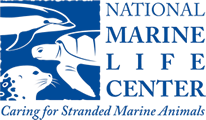Marine Mammal Health & Stranding Response Program
“Why do marine mammals strand?” Marine mammal strandings may occur due to disease, parasite infestation, harmful algal blooms, injuries from ship strikes, fishery entanglements, pollution exposure, trauma, starvation, or other reasons. The National Oceanic and Atmospheric Administration’s Marine Mammal Health & Stranding Response Program plays a key role in preventing and treating marine mammal strandings from these influences.
It was formalized in 1992 by amendments to the Marine Mammal Protection Act.

It is composed of stranding networks, responses/investigations of mortality events, biomonitoring of the relationship between toxic substances and illnesses in marine mammals, tissue/serum banking, and analytical quality assurance of tissue samples. Stranding networks are authorized by Stranding Agreements with the NOAA National Marine Fisheries Service, and operate on a mostly volunteer-run basis. Beach response organizations work with local marine mammal rehabilitation facilities if long-term care and rehabilitation from injury is needed. Both types of organizations are considered part of the stranding network.
That’s where we come in! At the National Marine Life Center, we do not partake in the beach recovery process, but receive our patients from local beach response organizations after they have been assessed, triaged, and urgent injuries have been stabilized for transport. Once we receive our patients, we do an intake exam and begin treatment for any injuries and illnesses. Once our patients have completed their rehabilitation process, they must undergo a series of tests to meet our release standards before they can be considered for release.

We run a complete blood panel to ensure that all necessary blood components are within normal levels, as well as ensuring there are no remaining illnesses or parasite infections that could be released back into the native population. Our seals must also exceed 50lbs, and be able to properly consume whole fish as well as proficiently catch and consume live fish. With these standards met, we send out the blood panel for confirmation and notify NOAA, and with their permission and a good bill of health, our patients are free to be released back to their home in the big blue!
Posted by Caitlin J.
Caitlin is a Summer, 2017 Animal Care and Education Intern at the National Marine Life Center. She is a recent graduate of Southeast Missouri State University with a Bachelor of Science in Marine Biology.
